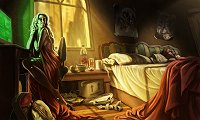 InterGalactic Medicine Show #36, Nov./Dec 2013
InterGalactic Medicine Show #36, Nov./Dec 2013
Reviewed by Chuck Rothman
“Escape from the Andromedan Empire” is about an author whose consciousness has been downloaded into a computer so he can create new fiction for a rabid fan (George R.R. Martin beware!). He may be just a program, but he retains his personality and feelings, and tries to find a way to escape, with the help of the many other authors the fan loves and has put into the same position. Ian Creasey has imagined a clever situation and the story involves solving the problem, but I didn’t care for the ending, which tries to move away from the expected but doesn’t have a compelling replacement.
K.C. Norton‘s “The Saltwater Wife,” is about Annike, who is married to Gernot. A man named Drejlp comes to town, looking to find a saltwater wife of his own. They come from the sea and are taken to live on land – not mermaids or selkies, but something else. It is up to Annike to find one for Drejlp, but she has an agenda all her own. The story creates a new mythology and Annike is a very appealing character, and her final victory is very satisfying.
“At the Old Folks’ Home at the End of the World” is John P. Murphy‘s portrayal of a series of vignettes where ancient gods live together, with their worshipers long gone. The short sketches are amusing, but it never becomes more than a series of vignettes. Very fluffy fare, but the ideas are entertaining.
A mysterious disease is at the center of “Once More to Kitty Hawk,” one that causes people to fade away. David’s father is suffers from it, and David decides to humor the man’s desire to visit Kitty Hawk. NC. Greg Kurzawa paints the picture of an adult dealing with the slow death of his father, but despite the originality in the disease and its symptoms, it could be replaced by any actual disease without any major changes. It’s a mainstream story with an SF element that isn’t really explored, nor is Kitty Hawk anything more than a random location.
Jim Beamon‘s “Light Crusader’s Dark Dessert” is another story about gods in an apocalyptic world where they come back to fight among themselves as they persuade humans to join them in bringing the dead back to life (sometimes as zombies, sometimes as human). Jake is a type of enforcer, who returns to his home town to deal with the rising of the gods there. I liked the characters and the situation, as well as the strong action sequences.
The final story, “The Sturdy Bookshelves of Pawel Oliszewski” by Ferrett Steinmetz, describes the work of Oliszewski, an unremarkable accountant who made bookcases in his spare time as a hobby, then gave them away to neighbors or anyone else who didn’t actively refuse him. But after years, it’s discovered that the very ordinary bookcases were more than just sturdy – they were indestructible. It leads to some interesting thoughts on the nature of work and art and is a fine story in its own right.